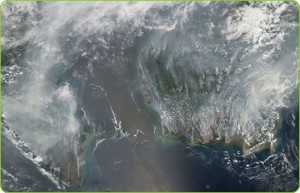Thick smoke from burning peatlands hangs over the capital of Central Kalimantan in Indonesian Borneo every morning. The smell from the smoke is pervasive, a constant reminder of how Indonesia has become the third largest greenhouse gas emitter in the world. Driven by relentless and ill advised palm oil expansion, Kalimantan’s carbon rich but relatively unproductive peatlands are being rapidly drained and burned. Across Indonesia, peatland destruction is releasing up to a billion tons of carbon dioxide a year – equivalent to emissions from 200 large coal power plants – in addition to fomenting wide social conflict and destroying critical habitat for orangutans, tigers and other species. Yet economic activities on peat contribute less than 1% to Indonesia’s GDP. Emissions from sparsely populated rural Central Kalimantan alone now exceed those of Jakarta, a sprawling traffic-choked mega-city of more than 10 million people. Indonesia Photo
From September 20-22, Central Kalimantan played host to the annual meeting of the Governor’s Climate and Forest Task Force (GCF). The GCF brings together California with 15 tropical forest states from the Brazilian Amazon, Peru, Mexico, Indonesia and Nigeria covering 20% of the worlds tropical forests to promote the development of REDD (Reducing Emissions from Deforestation and Degradation) mechanisms in carbon markets. Ironically, with heavy smoke from peat fires disrupting flights in and out of the province, the meeting almost had to be relocated to Jakarta. REDD was initially promoted by industrialized countries as a quick, easy and cheap way to address climate change under the UN Framework Convention on Climate Change as part of a wider fossil fuel emissions reduction agreement, but prospects for such a new international agreement have declined precipitously since the debacle at the Copenhagen Conference of Parties two years ago. While the urgency and importance of protecting peatlands and tropical rainforests is undeniable, at the same time, the true challenges and complexities of trying to define and implement REDD payment mechanisms on the ground at the sub-national level were in full display at the GCF meeting.
At the formal level, the outcomes of the GCF meeting were fairly straightforward. Delegates agreed to accept the Brazilian state of Matto Grosso and Madre de Dios in Peru as new members. The next GCF annual meeting will be hosted by the state of Chiapas in Mexico. The GCF established a new fund, with $1.5 million in seed money from the U.S. State Department, to assist with state capacity building. Efforts to expand GCF membership in Europe were endorsed. Discussions among stakeholders and rights holders in the GCF side events and corridors profiled some of the greater challenges and controversies. Perhaps foremost among these is the need for rights-based approaches to promote durable and just forest stewardship and green development, which was put forward forcibly by Indigenous and forest community organization participants. A strong statement was delivered to the GCF meeting by forest dependent community representatives from Aceh, Papua, Central Sulawesi and Kalimantan calling for, “guarantee on people’ full involvement and representation in every process and stage, especially in the project’s decision-making processes…rights and access to complete and comprehensive information…the right to manage and to utilize the forest and resources within it, which we have inherited from our ancestors…every decision concerning the benefits for the people should be defined by the people themselves.” Underlying and supporting this perspective, including from many GCF delegates, is a growing recognition that durable forest stewardship can only be achieved with full involvement, understanding and support of the forest dependent communities themselves. As Odigha Odigha (a Goldman Environmental Prize winner who RAN worked closely with in the 1990s), representing Nigeria’s Cross River State put it, “The people in the forest are the ones that must fully understand what REDD is because they have the final responsibility, not people in London, not people in Washington.” Similarly, the former Governor of Papua strongly emphasized community rights and empowerment in his proposals for promoting low-carbon green development pathways in Indonesia’s most heavily forested province. The GCF delegates have largely returned home, but here in Borneo the peat smoke remains. Yet, reasons for optimism in Central Kalimantan can still be found in some locally led initiatives. Native Dayak, Sudwido Limin, is not waiting for REDD to take action. At the tropical peatland research center that he established, Sudwido showed us how they are damming up drainage canals in abandoned peatland areas, restoring forest cover and fighting peatland fires in a community-based approach. The methods they are developing could be widely applied, and combined with a strict prohibition on further peatland conversion would go a long way to leashing in Indonesia’s soaring greenhouse gas emissions. Jakarta, are you listening?

